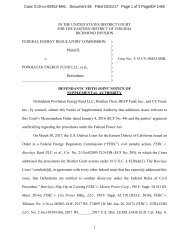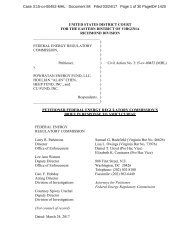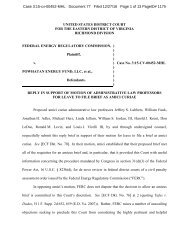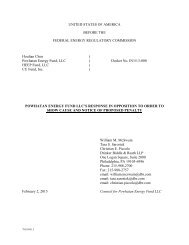FERC-v.-Barclays-180-1-Proposed-Brief
FERC-v.-Barclays-180-1-Proposed-Brief
FERC-v.-Barclays-180-1-Proposed-Brief
Create successful ePaper yourself
Turn your PDF publications into a flip-book with our unique Google optimized e-Paper software.
Case 2:13-cv-02093-TLN-DB Document <strong>180</strong>-1 Filed 11/07/16 Page 8 of 45<br />
1<br />
2<br />
3<br />
4<br />
5<br />
6<br />
7<br />
8<br />
9<br />
10<br />
11<br />
12<br />
13<br />
14<br />
15<br />
16<br />
17<br />
18<br />
19<br />
20<br />
21<br />
22<br />
23<br />
24<br />
25<br />
26<br />
27<br />
28<br />
Funk has served as a consultant to ACUS and has taught Federal Judicial Center programs.<br />
Professor Funk is a graduate of Columbia Law School and Harvard College.<br />
Additional amici are the following scholars:<br />
Jonathan H. Adler<br />
Johan Verheij Memorial Professor of Law<br />
Director, Center for Business Law &<br />
Regulation<br />
Case Western Reserve University School of<br />
Law<br />
Emily Hammond<br />
Professor of Law<br />
The George Washington University<br />
Law School<br />
Michael Herz<br />
Arthur Kaplan Professor of Law<br />
Benjamin Cardozo School of Law<br />
Yeshiva University<br />
Linda Jellum<br />
Ellison C. Palmer Professor of Tax Law<br />
Mercer University School of Law<br />
William S. Jordan, III<br />
C. Blake McDowell Professor of Law<br />
The University of Akron School of Law<br />
3<br />
Harold J. Krent<br />
Dean and Professor of Law<br />
IIT Chicago-Kent College of Law<br />
Don LeDuc<br />
President, Dean and Professor<br />
Western Michigan University Thomas M.<br />
Cooley Law School<br />
Ronald M. Levin<br />
William R. Orthwein Distinguished<br />
Professor of Law<br />
Washington University School of Law<br />
Nathan A. Sales<br />
Associate Professor of Law<br />
Syracuse University College of Law<br />
Louis J. Virelli III<br />
Professor of Law<br />
Stetson University College of Law<br />
The amici’s institutional affiliations are provided for identification purposes only.<br />
ARGUMENT<br />
Amici have grave concerns about the legal and policy implications of <strong>FERC</strong>’s apparent<br />
view of what constitutes a district court’s “de novo review” of an agency’s civil penalty<br />
assessment. As explained below, amici believe that <strong>FERC</strong>’s position runs counter to the<br />
traditional understanding of court enforcement actions for civil penalties and cannot be squared<br />
with the text, structure, or purpose of the Federal Power Act’s civil penalty assessment<br />
mechanism, which gives a defendant the choice of challenging <strong>FERC</strong>’s penalty assessment in a<br />
full trial-type proceeding before either an administrative law judge or a federal district court.<br />
What is more, <strong>FERC</strong>’s position raises serious due process and policy concerns, and it is all the<br />
more puzzling in the context of this enforcement action, where <strong>FERC</strong> seeks to have the Court<br />
summarily affirm what <strong>FERC</strong> itself has described as “the largest civil penalty imposed since the<br />
PROPOSED AMICI CURIAE BR. OF ADMIN. LAW PROFESSORS LUBBERS, FUNK ET AL.






